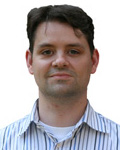Members of the NAR-Kolleg

Dr. Alexander Pashos
(correspondend member)
Liste "Menschliches Verhalten in evolutionärer Perspektive (MVE)"
The significance of grandparenthood from an evolutionary and social perspective
The investigation of grandparental caregiving is from a biological perspective an important contribution to the understanding of kin selection and nepotistic altruism in humans. A long lifespan, a prolonged childhood and the need for intensive child-care are typical biological characteristics of Homo sapiens, which make caregiving by grandparents of major importance. The classical grandmother hypothesis focuses on maternal grandmothers as intensive caregivers. In analyses of traditional societies and of past centuries’ historical family data, the presence of maternal grandmothers as family helpers was found to enhance newborns’ health and survival rates. Also in empirical sociological, psychological and evolutionary science studies from the Western world, asymmetric caregiving among the four grandparents was found. On average, maternal grandmothers provide the most care for grandchildren, followed by maternal grandfathers and paternal grandmothers; while the paternal grandfathers provide the least care. These differences cannot be explained by differential grandparents’ age or residential distance. However, in some patrilocal societies, such as traditional rural Greece, paternal grandparents care more for grandchildren than maternal. Various evolutionary theories explain these differences in grandparent caregiving as well as the significance of grandparenthood for the hominisation and the development of longevity. The underlying proximate mechanisms, however, are still largely unexplored.
Findings on the evolution of grandparenthood and its social functions are also highly relevant for the social sciences. A society such as Western society with its increased life expectancy, shorter working hours and lesser number of grandchildren compared to past centuries, predestines grandparents for their social role as caretakers. At the same time, this development results in a higher number of elderly people without grandchildren. In the discussion on challenges and opportunities of an aging society, insights into universal human social structures with regard to grandparents are of high significance. This contributes to an understanding and valuing of the social role and importance of elderly people, especially of women in their postreproductive second half of life.
Publications
- Pashos, A. & Christiansen, K. (1998). Diskriminative großelterliche Fürsorge - ein biologisches Phänomen? Eine Universalitätsstudie Deutschland-Griechenland. Homo, 49 (Suppl.), 73.
- Pashos, A. (2000). Does paternal uncertainty explain discriminative grandparental solicitude? A cross-cultural study in Greece and Germany. Evolution & Human Behavior 21, 97-109.
- Pashos, A. & Christiansen, K. (2000), Diskriminative großelterliche Fürsorge - ein biologisches Problem? In: Schnittstelle Mensch - Umwelt in Vergangenheit, Gegenwart und Zukunft, M. Schultz et al. (Ed.). Göttingen: Cuvillier, 99-102.
- Pashos, A. & Christiansen, K. (2000), Männlicher Status und weibliche Schönheit? Partnerwahlpräferenzen in Soziobiologie und Sozialpsychologie. Homo 51 (Suppl.), 96.
- Pashos, A. & Christiansen, K. (2002). Male status vs. female beauty? Mating preferences in sociobiology and social psychology. In: Homo - unsere Herkunft und Zukunft, M. Schultz et al. (Ed.). Göttingen: Cuvillier, 457-463.
- Pashos, A. (2002). Über die Rolle von Status, physischer Attraktivität und Taktiken in der menschlichen Partnerwahl. Soziokulturelle und evolutionsbiologische Mechanismen und Prozesse menschlichen Sozialverhaltens. Dissertation Universität Hamburg 2001. Göttingen: Cuvillier, 2002.
- Pashos, A. & Niemitz, C. (2003). Results of an explorative empirical study on human mating in Germany: Handsome men, not high-status men, succeed in courtship. Anthropologischer Anzeiger 61, 331-341.
- Pashos, A. & Niemitz, C. (2003). Was bevorzugt er, was bevorzugt sie? Die Bedeutung sozialer Einflüsse auf Partnerwahlpräferenzen für evolutionäre Interpretationen von Geschlechterunterschieden. In: Anthropologie der Geschlechter, H. Greil, Ch. Scheffler (Ed.). Potsdam: Universitätsverlag Potsdam, 104, 2003.
- Pashos, A. (2003). "Biologie des Reisens" – Perspektiven evolutionswissenschaftlicher Analysen touristischen Reiseverhaltens. Willy Scharnow-Institut für Tourismus, Freie Universität Berlin.
- Pashos, A. (2005). Menschliche Partnerwahl aus evolutionärer und sozialer Perspektive. Mitteilungen der Berliner Gesellschaft für Anthropologie, Ethnologie und Urgeschichte 26.
- Pashos, A. (2007). Asymmetric kin investment of grandparents, aunts and uncles: a two-generation-study from Pittsburgh. In: New Perspectives and Problems in Anthropology, È. B. Bodzsár, A. Zsákai (Ed.). Newcastle upon Tyne: Cambridge Scholars Publishing, 57-66.
- Pashos, A. (2007). Asymmetric kin investment of grandparents, aunts and uncles from an evolutionary perspective. Primate Behavior and Human Universals. Primate Report, Special Issue 2007.
- Pashos, A. (in Druck). Kin Investment Biases of Grandparents, Aunts and Uncles in Germany, Greece and the USA: Evolutionary Interpretations of Different Kin Caregiving Behavior. In: Human Evolution and Population Bio-Diversity in SE-Europe, Proceedings of the 2nd International Congress of Anthropology of the HAA, Th. Pitsios (Ed.). Athen.
- Pashos, A. & McBurney, D. H. (in Druck). Kin relationships and the caregiving biases of grandparents, aunts and uncles: A two generational questionnaire study. Human Nature.
Vita
| 1992 - 1997 | Studies at the Free University of Berlin, Humboldt University of Berlin, and University of Hamburg |
| 1997 | MA in Biological Anthropology, University of Hamburg |
| 1998 - 2002 | PhD in Biological Anthropology, University of Hamburg |
| 2002 - 2003 | Post-graduate degree in “Tourism Management & Regional Development” at the Willy Scharnow-Institute for Tourism, Free University of Berlin |
| 2003 - 2004 | Postdoctoral research fellow, Dept. of Psychology, University of Pittsburgh |
| 2004 - 2008 | Postdoctoral Researcher at the Institute of Human Biology and Anthropology, Free University of Berlin |
| since 7/2008 | Member of the NAR Kolleg, Heidelberg University |


